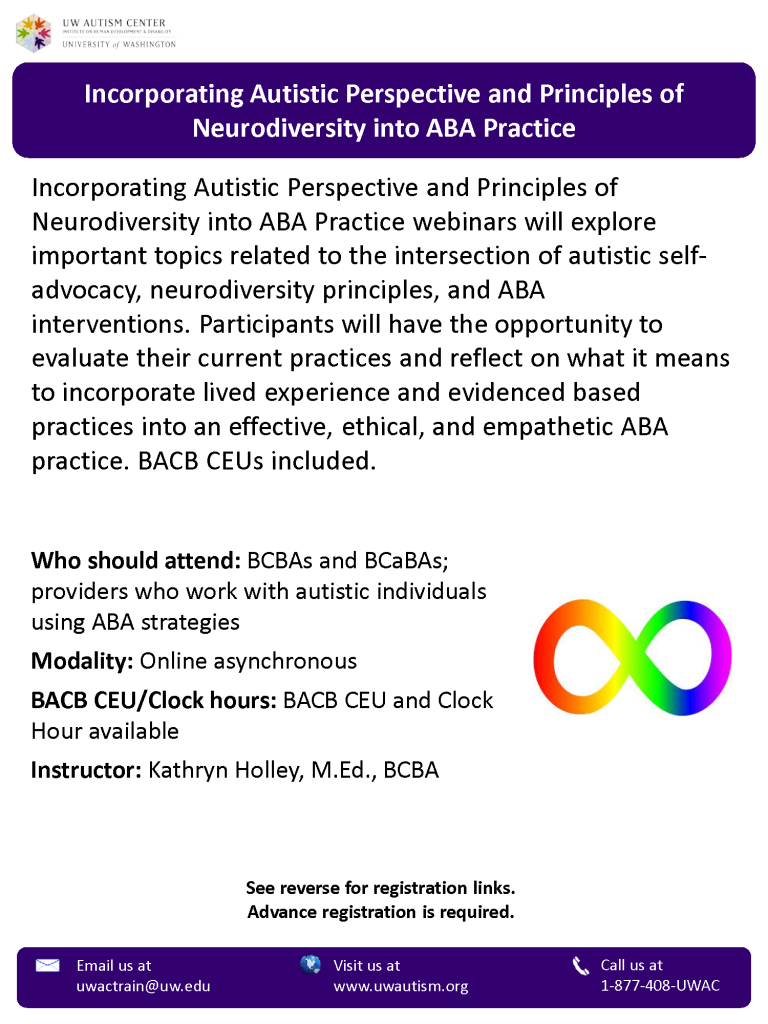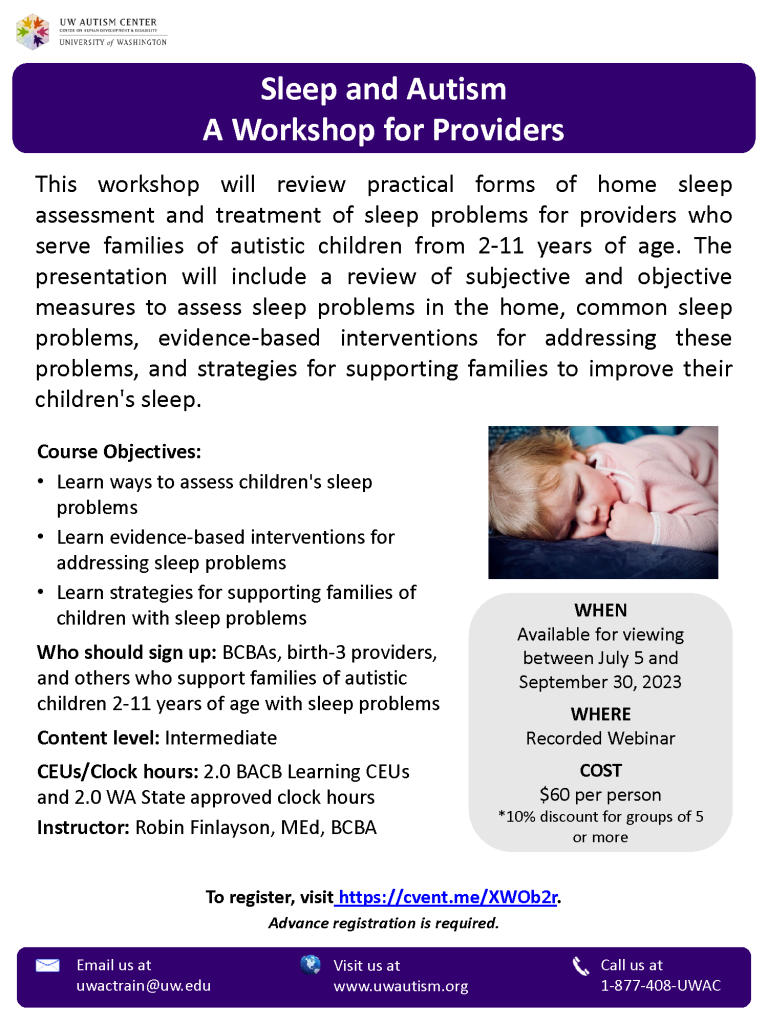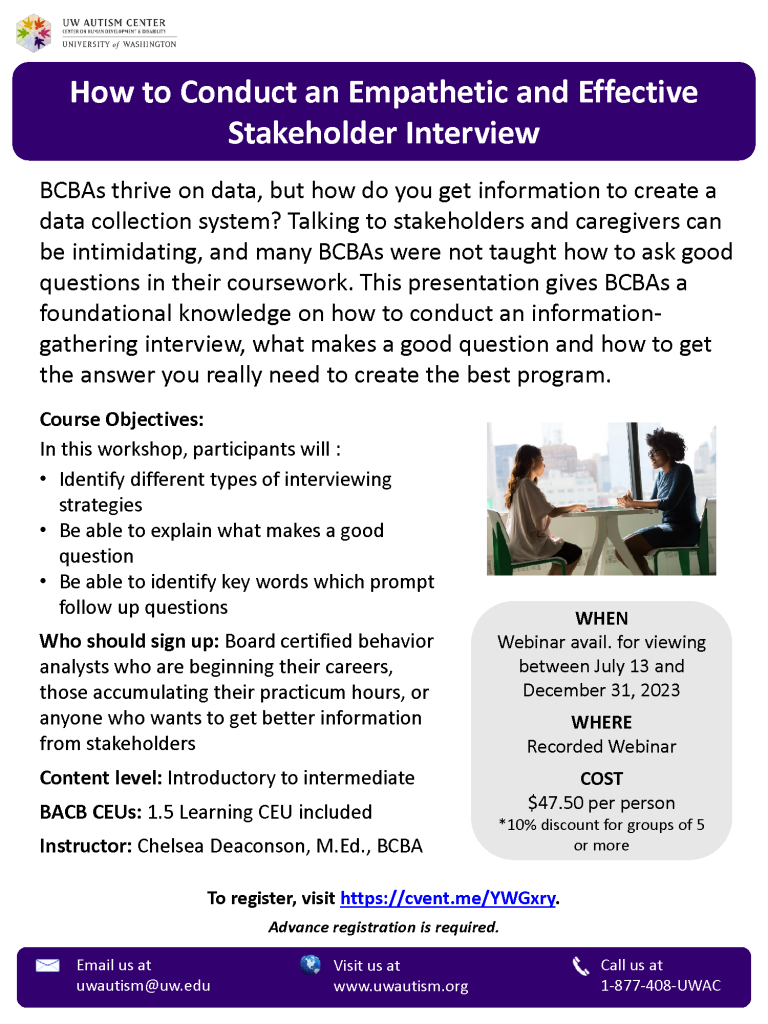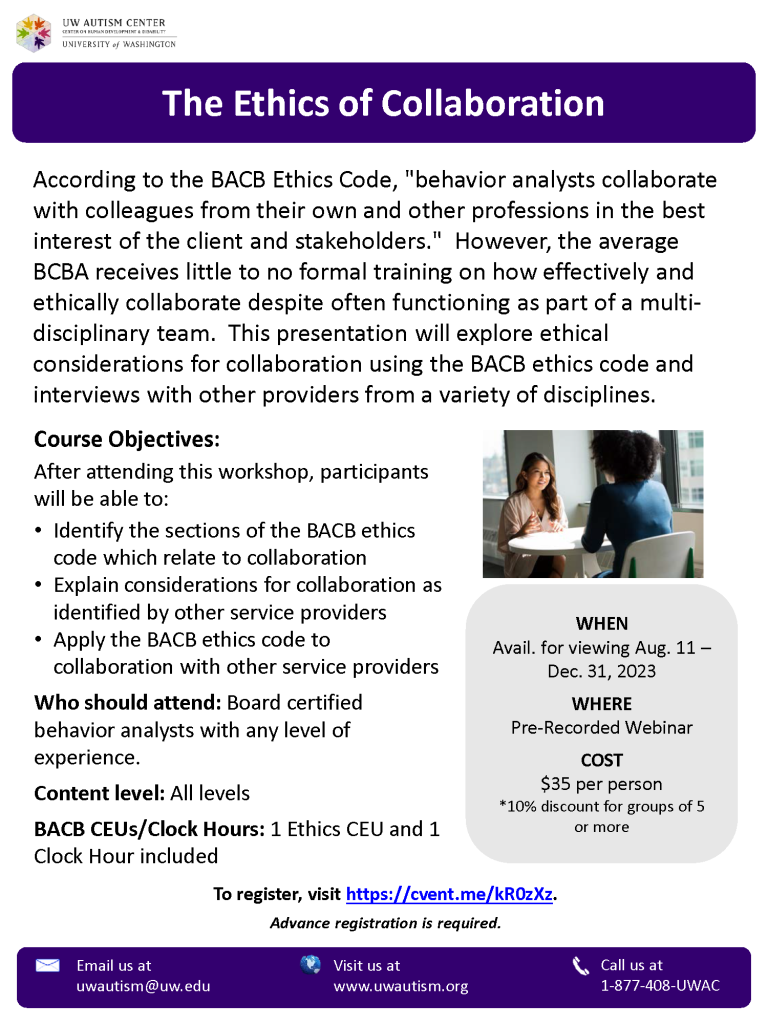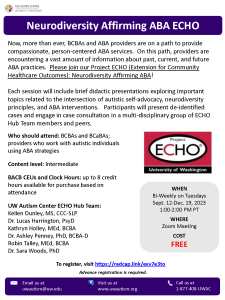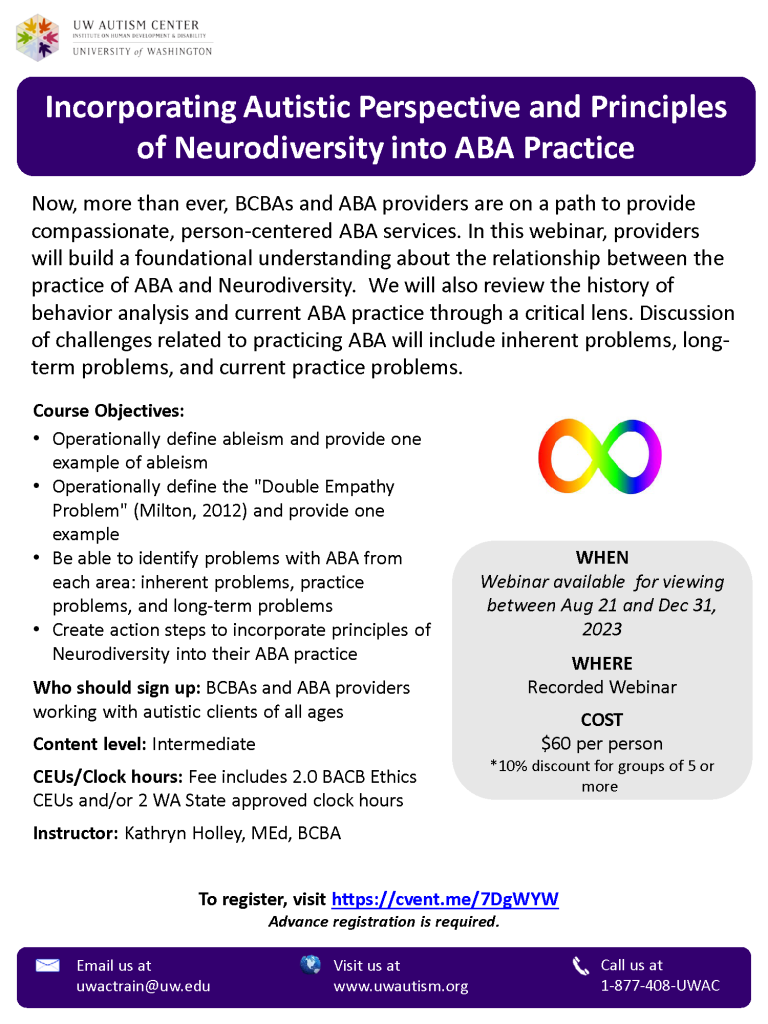UWAC Training
The UWAC is excited to announce the launch of recorded webinars! We offer Washington State approved clock hours for certificated educational staff in the state of Washington and CEUs for BCBAs and BCaBAs for some of our trainings. Please see event details below.
In-Person Trainings
Please check back!
Live Webinars
| Date(s) | Title | CEUs/Clock Hours |
|---|---|---|
| Coming soon! | Neurodiversity Affirming ABA ECHO | 8 BACB CEUs, 8 clock hours |
| Coming soon! | When Your Patient Thinks They’re Autistic | N/A |
Recorded Webinars
Individualized Training
Don’t see the topics your team is looking for? UWAC can offer individualized trainings to meet your needs.
Sign up to receive email updates on future trainings.
Incorporating Autistic Perspective and Principles of Neurodiversity Into ABA Practice:
A New Lens for Understanding Evidence-Based Practice
WHEN
Coming soon
WHERE
Recorded Webinar
COST (per person):
$35
*includes BACB CEUs & clock hours
*10% off for groups of 5 or more
Registration coming soon.
Incorporating Autistic Perspective and Principles of Neurodiversity into ABA Practice webinars will explore important topics related to the intersection of autistic self-advocacy, neurodiversity principles, and ABA interventions. Participants will have the opportunity to evaluate their current practices and reflect on what it means to incorporate lived experience and evidenced based practices into an effective, ethical, and empathetic ABA practice.
A New Lens for Understanding Evidence-Based Practice
The term “Evidence-Based Practice (EBP)” is often used without a common understanding of what EBP truly means in the field of Applied Behavior Analysis (ABA). In this webinar, a 3-part model of EBP: evidence, expertise, and context, will be introduced. Context will include balancing the needs and desires of the client and their caregivers and/or other stakeholders. Also present in the discussion of context, will be how to effectively incorporate feedback from the Autistic community and Neurodiversity Movement into your ABA practice.
Elements of compassionate, person-centered ABA will be introduced and continued throughout the series. Compassionate, person-centered ABA centers the client and their caregivers by balancing: intervention, client need and capacity, caregiver need and capacity, and incorporating principles of neurodiversity into practice.
Participants are highly encouraged to take “Introduction to Incorporating Principles of Neurodiversity into ABA” for additional context and understanding of EBP.
Course Objectives:
Participants will:
- Operationally define Evidence-Based Practice and Empirically Supported Treatment
- Discriminate between Evidence-Based Practice and Empirically Supported Treatment
- Provide 3 examples of contextual factors to consider when implementing Evidence-Based Practices
Who should attend: BCBAs and BCaBAs; providers who work with autistic individuals using ABA strategies
Content level: Intermediate
CEs/Clock hours: This program, when completed in its entirety, offers 1 BACB Ethics CEU for BCBAs and BCaBA certificants and 1 Washington State approved clock hour for WA State certificated educational staff. We are NOT approved providers for other CEUs related to this training.
Instructor: Kathryn Holley, M.Ed., BCBA
Cancellation/Refund Policy
Cancellations received at least two business weeks prior to course start date are eligible to receive a full refund less a $20 administrative fee. Cancellations must be received in writing by e-mail to uwactrain@uw.edu, fax to 206-598-7815, or U.S. mail (UW Autism Center, Box 357920, Seattle, WA 98195, Attn: Training Team) prior to the stated deadline. Cancellations received after the stated deadline will forfeit the full registration fee. Refunds will not be available for registrants who choose not to attend a class. UW Autism Center reserves the right to cancel a course due to low enrollment, inclement weather, or other circumstances that would make the course non-viable. If UW Autism Center cancels a course, registrants will be notified within 24 hours of the first class date and offered a full refund or the option to transfer registration to another course.
Incorporating Autistic Perspective and Principles of Neurodiversity Into ABA Practice:
Assessment and Goal Development for ABA Programs
WHEN
Coming soon
WHERE
Recorded Webinar
COST (per person):
$60
*includes BACB CEUs & clock hours
*10% off for groups of 5 or more
Registration coming soon.
Incorporating Autistic Perspective and Principles of Neurodiversity into ABA Practice webinars will explore important topics related to the intersection of autistic self-advocacy, neurodiversity principles, and ABA interventions. Participants will have the opportunity to evaluate their current practices and reflect on what it means to incorporate lived experience and evidenced based practices into an effective, ethical, and empathetic ABA practice.
Participants are highly encouraged to take “Introduction to Incorporating Principles of Neurodiversity into ABA” for additional context and understanding of EBP.
Assessment for ABA Programs
High quality ABA practice starts with thorough and compassionate assessment procedures. This webinar will discuss best practices in assessment through an Evidence Based Practice (EBP) model. Participants will consider how to effectively incorporate current literature and personal expertise into assessment while taking into consideration client specific contextual and environmental factors. Topics covered will include: consenting clients of all ages for assessment, strategies to determine appropriate assessment tools, and strategies for collecting relevant family history and current information to inform client context.
Course Objectives:
Participants will:
- Provide one example of how to effectively incorporate current literature into assessment practices
- Provide 1 example of non-verbal consent and 1 example of verbal consent
- Identify 1 strategy for obtaining relevant family history during assessment
Goal Development for ABA Programs
Thoughtful goal development is the cornerstone of an effective ABA program. In this session participants will apply the Evidence Base Practice (EBP) model to goal development. Participants will learn about current evidence pertaining to goal setting, including manualized programs. Participants will have an opportunity to evaluate their clinical expertise and learn to balance that expertise with evidence and contextual information.
With a focus on compassionate ABA, participants will discuss the need to balance the inherent power dynamics between BCBAs, clients, and stakeholders while working to center the client’s needs. Participants will also be asked to critically examine potential goals by taking into consideration the potentially ableist nature of some common ABA goals.
Course Objectives:
Participants will:
- Summarize current evidence on goal setting
- Operationally define the role of the BCBA in goal setting
- Be able to identify ableist language in goal setting
Who should sign up: BCBAs and BCaBAs; providers who work with autistic individuals using ABA strategies
Content level: Intermediate
CEUs/Clock hours: This program, when completed in its entirety, offers 1 BACB Learning CEU and 1 Ethics CEU for BCBAs and BCaBA certificants and 2 Washington State approved clock hour for WA State certificated educational staff. We are NOT approved providers for other CEUs related to this training.
Instructor: Kathryn Holley, M.Ed., BCBA
Cancellation/Refund Policy
Cancellations received at least two business weeks prior to course start date are eligible to receive a full refund less a $20 administrative fee. Cancellations must be received in writing by e-mail to uwactrain@uw.edu, fax to 206-598-7815, or U.S. mail (UW Autism Center, Box 357920, Seattle, WA 98195, Attn: Training Team) prior to the stated deadline. Cancellations received after the stated deadline will forfeit the full registration fee. Refunds will not be available for registrants who choose not to attend a class. UW Autism Center reserves the right to cancel a course due to low enrollment, inclement weather, or other circumstances that would make the course non-viable. If UW Autism Center cancels a course, registrants will be notified within 24 hours of the first class date and offered a full refund or the option to transfer registration to another course.
Incorporating Autistic Perspective and Principles of Neurodiversity Into ABA Practice:
Building an Antecedent Focused ABA Practice and Effective and Ethical Practices in Reinforcement
WHEN
Coming soon
WHERE
Recorded Webinar
COST (per person):
$60
*includes BACB CEUs & clock hours
*10% off for groups of 5 or more
Registration coming soon.
Incorporating Autistic Perspective and Principles of Neurodiversity into ABA Practice webinars will explore important topics related to the intersection of autistic self-advocacy, neurodiversity principles, and ABA interventions. Participants will have the opportunity to evaluate their current practices and reflect on what it means to incorporate lived experience and evidenced based practices into an effective, ethical, and empathetic ABA practice.
Participants are highly encouraged to take “Introduction to Incorporating Principles of Neurodiversity into ABA” for additional context and understanding of EBP.
Building an Antecedent Focused ABA Practice
Historically, ABA has relied heavily on consequence based strategies such as extinction, redirection, response cost and reinforcement. Current ABA practices and compassionate ABA practices call for a focus on antecedent based strategies to support clients to be successful. During this hour long webinar, participants will utilize the EBP model to determine how to incorporate more antecedent based strategies into ABA practice. Particular attention will be paid to strategies to encourage stakeholders to implement environmental modifications to reduce barriers and increase access to all environments.
Course Objectives:
Participants will:
- State 1 way in which they can incorporate additional antecedent strategies into their ABA practice
- Learn 1 strategy to motivate stakeholders to incorporate more environmental modifications
Effective and Ethical Practices in Reinforcement
Reinforcement is one of the most powerful tools behavior analysts have to create behavior change. With this powerful tool, behavior analysts also have a responsibility to implement principles of reinforcement ethically and effectively. In this webinar participants will learn about current concerns from the Autistic community regarding the use of reinforcement as well as evaluate the ways in which reinforcement can be used effectively and ways that reinforcement can be misused.
Course Objectives:
Participants will:
- Identify at least 1 concern from the Autistic community about the use of reinforcement in ABA
- Identify at least 1 effective and ethical reinforcement strategy
- Identify at least 1 ineffective reinforcement strategy
- Identify at least 1 unethical reinforcement strategy
Who should attend: BCBAs and BCaBAs; providers who work with autistic individuals using ABA strategies
Content level: Intermediate
CEs/Clock hours: This program, when completed in its entirety, offers 1 BACB Learning CEU and 1 Ethics CEU for BCBAs and BCaBA certificants and 2 Washington State approved clock hour for WA State certificated educational staff. We are NOT approved providers for other CEUs related to this training.
Instructor: Kathryn Holley, M.Ed., BCBA
Cancellation/Refund Policy
Cancellations received at least two business weeks prior to course start date are eligible to receive a full refund less a $20 administrative fee. Cancellations must be received in writing by e-mail to uwactrain@uw.edu, fax to 206-598-7815, or U.S. mail (UW Autism Center, Box 357920, Seattle, WA 98195, Attn: Training Team) prior to the stated deadline. Cancellations received after the stated deadline will forfeit the full registration fee. Refunds will not be available for registrants who choose not to attend a class. UW Autism Center reserves the right to cancel a course due to low enrollment, inclement weather, or other circumstances that would make the course non-viable. If UW Autism Center cancels a course, registrants will be notified within 24 hours of the first class date and offered a full refund or the option to transfer registration to another course.
Incorporating Autistic Perspective and Principles of Neurodiversity Into ABA Practice:
Consent as an Ongoing Practice
WHEN
Coming soon
WHERE
Recorded Webinar
COST (per person):
$35
*includes BACB CEUs & clock hours
*10% off for groups of 5 or more
Registration coming soon.
Incorporating Autistic Perspective and Principles of Neurodiversity into ABA Practice webinars will explore important topics related to the intersection of autistic self-advocacy, neurodiversity principles, and ABA interventions. Participants will have the opportunity to evaluate their current practices and reflect on what it means to incorporate lived experience and evidenced based practices into an effective, ethical, and empathetic ABA practice.
Consent as an Ongoing Practice
Now, more than ever, BCBAs have a responsibility to ensure clients are giving clear, enthusiastic consent/assent. Discussion of consent and assent are becoming more common in the delivery of behavior analytic service, and BCBAs have a responsibility to ensure they understand consent and assent and to gain consent or assent consistently throughout sessions. This webinar will address the basics of consent and assent, including: operational definitions of consent and assent, strategies to evaluate clients consent or assent, and what to do when a client withdraws consent or assent in the moment.
Course Objectives:
Participants will:
- Operationally define consent and assent
- Learn at least 1 strategy to evaluate client consent or assent
- Learn at least 1 strategy to implement when a client withdraws consent or assent
Who should attend: BCBAs and BCaBAs; providers who work with autistic individuals using ABA strategies
Content level: Intermediate
CEs/Clock hours: This program, when completed in its entirety, offers 1 BACB Ethics CEU for BCBAs and BCaBA certificants and 1 Washington State approved clock hour for WA State certificated educational staff. We are NOT approved providers for other CEUs related to this training.
Instructor: Kathryn Holley, M.Ed., BCBA
Cancellation/Refund Policy
Cancellations received at least two business weeks prior to course start date are eligible to receive a full refund less a $20 administrative fee. Cancellations must be received in writing by e-mail to uwactrain@uw.edu, fax to 206-598-7815, or U.S. mail (UW Autism Center, Box 357920, Seattle, WA 98195, Attn: Training Team) prior to the stated deadline. Cancellations received after the stated deadline will forfeit the full registration fee. Refunds will not be available for registrants who choose not to attend a class. UW Autism Center reserves the right to cancel a course due to low enrollment, inclement weather, or other circumstances that would make the course non-viable. If UW Autism Center cancels a course, registrants will be notified within 24 hours of the first class date and offered a full refund or the option to transfer registration to another course.
Sleep and Autism – A Workshop for Providers
WHEN
Coming soon
WHERE
Recorded Webinar
COST (per person):
$60
*includes BACB CEUs & clock hours
*10% off for groups of 5 or more
Registration coming soon.
This workshop will review practical forms of home sleep assessment and treatment of sleep problems for providers who serve families of autistic children from 2-11 years of age. The presentation will include a review of subjective and objective measures to assess sleep problems in the home, common sleep problems, evidence-based interventions for addressing these problems, and strategies for supporting families to improve their children’s sleep.
Course Objectives:
1) Learn ways to assess children’s sleep problems
2) Learn evidence-based interventions for addressing sleep problems
3) Learn strategies for supporting families of children with sleep problems
Who should sign up: BCBAs, birth-3 providers, and others who support families of autistic children 2-11 years of age with sleep problems
Content level: Intermediate
CEUs/Clock hours: This workshop, when completed in full, offers 2 BACB Learning CEUs and 2 WA State approved clock hours. We are NOT approved providers for other CEUs related to this training.
Instructor: Robin Finlayson, M.Ed., BCBA
Cancellation/Refund Policy
Cancellations received at least two business weeks prior to course start date are eligible to receive a full refund less a $20 administrative fee. Cancellations must be received in writing by e-mail to uwactrain@uw.edu, fax to 206-598-7815, or U.S. mail (UW Autism Center, Box 357920, Seattle, WA 98195, Attn: Training Team) prior to the stated deadline. Cancellations received after the stated deadline will forfeit the full registration fee. Refunds will not be available for registrants who choose not to attend a class. UW Autism Center reserves the right to cancel a course due to low enrollment, inclement weather, or other circumstances that would make the course non-viable. If UW Autism Center cancels a course, registrants will be notified within 24 hours of the first class date and offered a full refund or the option to transfer registration to another course.
Structuring Parent Coaching for Success
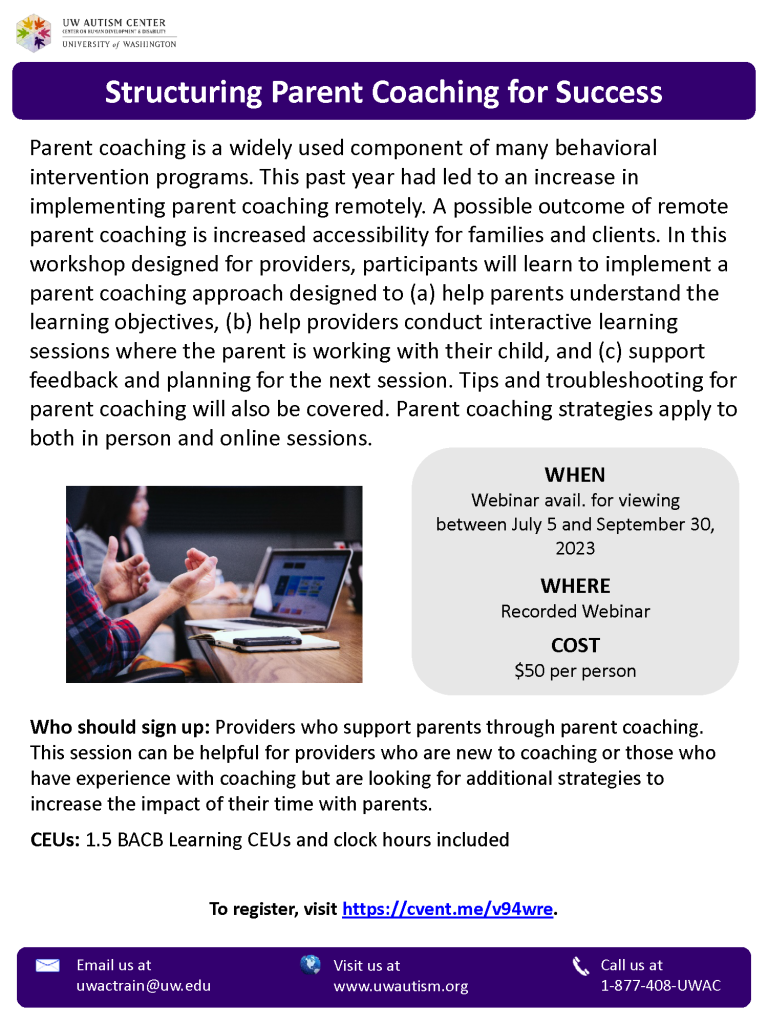
WHEN
Coming soon
WHERE
Recorded Webinar
COST (per person):
$50
*includes BACB CEUs & clock hours
*10% off for groups of 5 or more
Registration coming soon.
Parent coaching is a widely used component of many behavioral intervention programs. This past year had led to an increase in implementing parent coaching remotely. A possible outcome of remote parent coaching is increased accessibility for families and clients.
In this webinar designed for providers, participants will learn to implement a parent coaching approach designed to (a) help parents understand the learning objectives, (b) help providers conduct interactive learning sessions where the parent is working with their child, and (c) support feedback and planning for the next session. Tips and troubleshooting suggestions for parent coaching will also be covered. Parent coaching information covered in this session apply to both in person and online sessions.
Course Objectives:
- Describe parent coaching model
- Name 3 key elements for conducting a successful interactive learning session
- Describe 2 strategies for delivering feedback
- Describe common challenges and possible suggestions for trouble shooting for parent coaching
Who should sign up: Providers who support parents through parent coaching. This session can be helpful for providers who are new to coaching or those who have experience with coaching but are looking for additional strategies to increase the impact of their time with parents.
Content level: Introductory to advanced
CEUs and Clock Hours: This program, when watched in full, offers 1.5 BACB Learning CEUs for BCBA and BCaBA certificants or 1.5 Washington State Approved Clock Hours for certificated educational staff in WA state. A general certificate of completion will also be provided to general attendees.
Instructor: Ashley Penney, Ph.D., BCBA-D
Cancellation/Refund Policy
Cancellations received at least two business weeks prior to course start date are eligible to receive a full refund less a $20 administrative fee. Cancellations must be received in writing by e-mail to uwactrain@uw.edu, fax to 206-598-7815, or U.S. mail (UW Autism Center, Box 357920, Seattle, WA 98195, Attn: Training Team) prior to the stated deadline. Cancellations received after the stated deadline will forfeit the full registration fee. Refunds will not be available for registrants who choose not to attend a class. UW Autism Center reserves the right to cancel a course due to low enrollment, inclement weather, or other circumstances that would make the course non-viable. If UW Autism Center cancels a course, registrants will be notified within 24 hours of the first class date and offered a full refund or the option to transfer registration to another course.
How to Conduct an Empathetic and Effective Stakeholder Interview
WHEN
Coming soon
WHERE
Recorded Webinar
COST (per person):
$47.50
*includes BACB CEUs & clock hours
*10% off for groups of 5 or more
Registration coming soon.
BCBAs thrive on data, but how do you get information to create a data collection system? Talking to stakeholders and caregivers can be intimidating, and many BCBAs were not taught how to ask good questions in their coursework. This presentation gives BCBAs a foundational knowledge on how to conduct an information-gathering interview, what makes a good question and how to get the answer you really need to create the best program.
Course Objectives:
In this workshop, participants will:
- Identify different types of interviewing strategies
- Be able to explain what makes a good question
- Be able to identify key words which prompt follow up questions
Who should sign up: Board certified behavior analysts who are beginning their careers, those accumulating their practicum hours, or anyone who wants to get better information from stakeholders
Content level: Introductory to intermediate
CEUs/Clock Hours: This training, when completed in full, offers 1.5 Ethics CEUs for BCBAs and BCaBAs and 1.5 Washington State approved clock hours for certificated educational staff in WA State. We are NOT approved providers for other CEUs related to this workshop. Certificates of completion will be provided at the end of the workshop.
Instructor: Chelsea Deaconson, M.Ed., BCBA
Cancellation/Refund Policy
NO REFUNDS FOR PRERECORDED TRAININGS
The Ethics of Collaboration
WHEN
Coming soon
WHERE
Recorded Webinar
COST (per person):
$35
*includes BACB CEU and clock hour
*10% off for groups of 5 or more
Registration coming soon!
According to the BACB Ethics Code, “behavior analysts collaborate with colleagues from their own and other professions in the best interest of the client and stakeholders.” However, the average BCBA receives little to no formal training on how effectively and ethically collaborate despite often functioning as part of a multi-disciplinary team. This presentation will explore ethical considerations for collaboration using the BACB ethics code and interviews with other providers from a variety of disciplines.
Course Objectives:
After attending this workshop, participants will be able to:
- Identify the sections of the BACB ethics code which relate to collaboration
- Explain considerations for collaboration as identified by other service providers
- Apply the BACB ethics code to collaboration with other service providers
Who should attend: Board certified behavior analysts with any level of experience
Content level: All levels
CEUs/Clock Hours: This training, when completed in full, offers 1 Ethics CEU for BCBAs and BCaBAs and 1 Washington State approved clock hour for certificated educational staff in WA State. We are NOT approved providers for other CEUs related to this workshop. Certificates of completion will be provided at the end of the workshop.
Instructor: Chelsea Deaconson, M.Ed., BCBA
Cancellation/Refund Policy
NO REFUNDS FOR PRERECORDED TRAININGS
Neurodiversity Affirming ABA ECHO
WHEN
Coming soon
WHERE
Live Webinar
COST (per person):
FREE
*BACB CEUs & clock hours available for purchase based on attendance
Registration for this group is now closed. Please complete this form to be added to the interest list for our next group.
Now, more than ever, BCBAs and ABA providers are on a path to provide compassionate, person-centered ABA services. On this path, providers are encountering a vast amount of information about past, current, and future ABA practices. Please join our Project ECHO (Extension for Community Healthcare Outcomes): Neurodiversity Affirming ABA!
Each session will include brief didactic presentations exploring important topics related to the intersection of autistic self-advocacy, neurodiversity principles, and ABA interventions. Participants will present de-identified cases and engage in case consultation in a multi-disciplinary group of ECHO Hub Team members and peers.
Course Objectives:
- Participants will operationally define neurodiversity and related terms such as abelism.
- Participants will be able to identify problems with ABA from each area: inherent problems, practice problems, and long term problems.
- Participants will create action steps to incorporate principles of Neurodiversity into their ABA practice.
Who should attend: BCBA and BCaBA; providers who work with autistic individuals using ABA strategies
Content level: Intermediate
BACB CEUs/Clock Hours: Up to 8 credit hours available for purchase based on attendance
UW Autism Center ECHO Hub Team:
- Kellen Dunley, MS, CCC-SLP
- Dr. Lucas Harrington, PsyD
- Kathryn Holley, MEd, BCBA
- Dr. Ashley Penney, PhD, BCBA-D
- Robin Talley, MEd, BCBA
- Dr. Sara Woods, PhD
Cancellation/Refund Policy
Please provide 48-hour notice by emailing uwactrain@uw.edu if you will be unable to attend a session.
Introduction to Incorporating Autistic Perspective and Principles of Neurodiversity
Into ABA Practice
WHEN
Coming soon
WHERE
Recorded Webinar
COST (per person):
$60
*includes BACB CEUs & clock hours
*10% off for groups of 5 or more
Registration coming soon.
This is a recording from the live webinar on April 10, 2023.
Now, more than ever, BCBAs and ABA providers are on a path to provide compassionate, person centered ABA services. On this path, providers are encountering a vast amount of information about the relationship of current and past ABA practices and harm, voices of autistic advocates, and how to incorporate the principles of Neurodiversity into ABA practices.
In this webinar, providers will build a foundational understanding about the relationship between the practice of ABA and Neurodiversity by discussing contextual factors including ableism and the Double Empathy Problem (Milton, 2012). We will also review the history of behavior analysis and current ABA practice through a critical lens. Discussion of challenges related to practicing ABA will include inherent, long term, and current practice problems. At the conclusion of this webinar, participants will have the opportunity to discuss “where we go from here” in terms of addressing practice problems within ABA and building more compassionate, person centered practices.
Course Objectives:
In this workshop, participants will:
- Operationally define ableism and provide one example of ableism
- Operationally define the “Double Empathy Problem” (Milton, 2012) and provide one example
- Be able to identify problems with ABA from each area: inherent problems, practice problems, and long term problems
- Create action steps to incorporate principles of Neurodiversity into their ABA practice
Who should sign up: BCBAs and ABA providers who are interested in incorporating Autistic voices, principles of Neurodiversity, and anti-ableist practices into their ABA practice
Content level: Intermediate
CEs/Clock hours: This program, when completed in its entirety, offers 2.0 BACB Ethics CEUs for BCBAs and BCaBA certificants and 2.0 Washington State approved clock hours for WA State certificated educational staff. We are NOT approved providers for other CEUs related to this training.
Instructor: Kathryn Holley, M.Ed., BCBA
Cancellation/Refund Policy
NO REFUND FOR RECORDED TRAININGS
Finding the Right ABA Provider for You and Your Child
WHEN
On-Demand
WHERE
Recorded Webinar
COST
FREE (donations appreciated)
The University of Washington Autism Center’s webinars are usually pay-to-watch. However, we feel that it is important to make this webinar available to all families. If this video is valuable to you, we ask that you make a donation at whatever level you can afford. Your support will help us continue to offer low- and no-cost services to people in need.
Dr. Ashley Penney, PhD, BCBA-D, of the UW Autism Center, shares helpful tips for understanding ABA therapy and considerations for finding a good provider fit for your family and child. This FREE webinar is intended for parents of children recently diagnosed with autism spectrum disorder who are looking for information about starting an ABA program. The University of Washington Autism Center’s webinars are usually pay-to-watch. However, we feel that it is important to make this webinar available to all families. If this video is valuable to you, we ask that you make a donation at whatever level you can afford, using the link below. Your support will help us continue to offer low- and no-cost services to people in need.
Target Audience: Parents or other caregivers of children recently diagnosed with autism spectrum disorder
Presenter: Ashley Penney, PhD, BCBA-D
Introduction to Neurodiversity and Autistic Culture for Parents of Young Children
WHEN
On-Demand
WHERE
Recorded Webinar
COST
FREE (donations appreciated)
The University of Washington Autism Center’s webinars are usually pay-to-watch. However, we feel that it is important to make this webinar available to all families. If this video is valuable to you, we ask that you make a donation at whatever level you can afford. Your support will help us continue to offer low- and no-cost services to people in need.
When a child is first diagnosed with autism, or autism is first suspected, the pressure for parents to “get it right” is often overwhelming. Parents can be intimidated by an emphasis on deficits and urgent need for treatment. This webinar focuses on finding joy, connection, and meaning in the experience of autism, while remaining realistic about the challenges of raising a child whose needs are often unaccommodated by the world.
Target Audience: Parents or other caregivers of young autistic children
Presenter: Lucas Harrington, PsyD
Talking to Your Child About Their Autism
WHEN
On-Demand
WHERE
Recorded Webinar
COST
FREE (donations appreciated)
The University of Washington Autism Center’s webinars are usually pay-to-watch. However, we feel that it is important to make this webinar available to all families. If this video is valuable to you, we ask that you make a donation at whatever level you can afford. Your support will help us continue to offer low- and no-cost services to people in need.
Learn how to talk to your child about their autism in this free 45-minute recorded webinar. We share ideas for how to promote neurodiversity at home, how to help your child understand what it means to be autistic, and strategies for equipping your child to be their own advocate. Lots of resources are included, as well as useful insight from autistic advocates like Dr. Lamar Hardwick, Dr. Lucas Harrington, Timotheus T.J. Gordon, and Ivanova Smith.
Additional Resource: 13 Tips for Talking to Your Child About Their Autism
Target Audience: Parents and family members of autistic children
Presenter: Sara Woods, Ph.D.
Individualized Training
The UW Autism Center training program is here to help schools and agencies provide evidence-based programs for autistic students and individuals. Our experienced staff provides workshops to meet the specific needs of teachers, administrators, educational assistants, other school-based staff, and community providers. Workshops can be tailored for those with beginning through advanced levels of knowledge and experience. Topics include:
- Understanding ASD and impact on school behavior
- Inclusion for students with ASD
- The ins and outs of applied behavior analysis
- Using visuals supports
- Structuring the classroom for success
- Preventing and managing challenging behaviors
- Teaching executive functioning and organizational skills
- Developing and implementing social skills goals
- Strategies to teach communication skills in the classroom
- How to monitor progress – data collection
To request an individualized workshop, please complete our Training Request Form (PDF) (338 KB).
Cancellation/Refund Policy
LIVE EVENTS
Cancellations received at least two business weeks prior to course start date are eligible to receive a full refund less a $20 administrative fee. Cancellations must be received in writing by e-mail to uwactrain@uw.edu, fax to 206-598-7815, or U.S. mail (UW Autism Center, Box 357920, Seattle, WA 98195, Attn: Training Team) prior to the stated deadline. Cancellations received after the stated deadline will forfeit the full registration fee. Refunds will not be available for registrants who choose not to attend a class. UW Autism Center reserves the right to cancel a course due to low enrollment, inclement weather, or other circumstances that would make the course non-viable. If UW Autism Center cancels a course, registrants will be notified within 24 hours of the first class date and offered a full refund or the option to transfer registration to another course.
PRERECORDED EVENTS
No refunds
Disability Accommodation
To request disability accommodation, contact the Disability Services Office at 206.543.6450 (voice), 206.543.6452 (TTY), 206.685.7264 (FAX), or dso@uw.edu, preferably at least 10 days in advance of the event.

